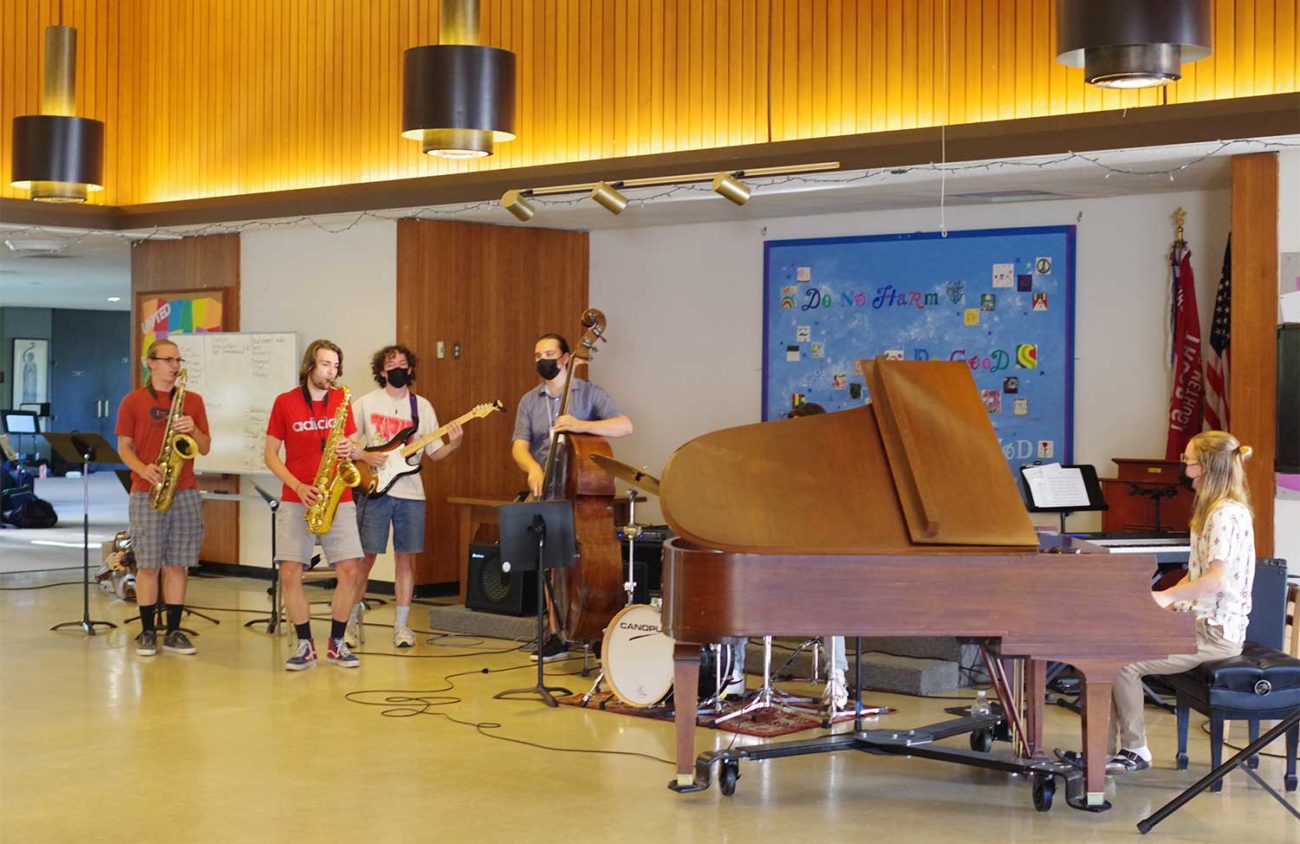Once upon a time, all I cared about was music and the guitar.
As a teenager, I’d play guitar all day, learning songs by AC/DC, Guns ‘n’ Roses and the Rolling Stones. I didn’t have much of a social life then, but who needs parties when you’ve got a guitar and a couple of friends who want to jam?
As I got older, life got in the way of music. But I began to have a growing interest in jazz guitar. I tried to learn it over the years but had trouble getting started. Sure, I learned a bit of music theory in college, but jazz is a whole new world of memorizing new scales, chord shapes and various other concepts.
When saxophonist and Oregon Jazz Workshop Director Joe Manis invited me to sit in for a day of the weeklong series exploring the art of playing in small jazz ensembles at Eugene’s First United Methodist Church in early August, I jumped at the chance.
The workshop consists of five full days diving into some fundamentals of small jazz ensembles, including music theory, ear listening and performance. It was founded in 2021 as a way to sharpen jazz chops when COVID-19 had closed music venues and schools, he told me last year.
The workshop’s high-caliber Oregon-based jazz professionals offer mentorship for the participants who are rehearsing for an end-of-workshop concert, and, in between rehearsals, hold masterclass sessions that cover a range of jazz topics.
Just one day at the workshop blew away the layers of dust burying the music theory in my brain, and it also kickstarted a serious jump into learning jazz.
Breaking down jazz
Drummers are pounding away at different rhythms. Saxophonists and trumpetists are blaring riffs. Pianists are banging chords. And somewhere in the middle of it all, someone is playing “The Star Spangled Banner.”
It’s a chaotic scene of about two dozen musicians just doing their own thing.
Afterward, Manis tells the group of musicians that the point of the free improvisation was to convey the importance of listening and building an ear for what’s around you. It’s to build awareness of listening to your ensemble. And free improvisation, he adds, is a good way to be in the zone.
The Oregon Jazz Workshop has seven Oregon-based jazz professionals working as mentors: saxophonist Manis, pianist and workshop associate director Wes Georgiev, drummer Charlie Doggett, pianist George Colligan, bassist Garrett Baxter, pianist Kerry Politzer and saxophonist Roger Woods.
During the workshop, these faculty members work with rehearsal groups, providing advice on interpreting jazz standards. Between rehearsals, faculty also lead masterclass sessions on elements of jazz, such as clave rhythm in Afro-Cuban jazz.
Baxter holds a discussion aimed at guitarists about bass guitar. The conversation veers away from jazz as he talks. And that’s because he says he’s looking at the bass’s role in Black music. So in addition to lecturing about fundamentals of playing the bass, he talks about how amazing Prince is with the instrument and urges us to listen to artists from the Minneapolis music scene.
Plugging in
With my white Fender Telecaster slung over my shoulder, I’m feeling nervous about sitting in for a rehearsal. It’s the first time that I’ve jammed in a group setting since playing in a rock band a few years ago.
This year’s workshop general attendance has a diverse participant age demographic, ranging from high school students to older adults, Manis tells me, but turnout was affected a bit by summer plans.
All participants are then divided into small groups that are rehearsing for a concert at the end of the workshop, practicing songs and looking for the right balance for a 15- to 20-minute performance. It shouldn’t have too many similar songs, and the pieces can’t go on too long and feel like a funk jam, jokes Manis, because Eugene has too many of those.
I plug in my amplifier in one of the rehearsal rooms at First United, a classroom likely used for Sunday School that — for this week, at least — is used to praise jazz and its innovators.
The main guitarist in the group shows me the riff for Herbie Hancock’s “Cantaloupe Island” and shares his music stand with me. The chords don’t look too intimidating, I reassure myself. The drummer counts us in, and away we go.
The song’s cool rhythm helps me ease into the groove, and we all take turns with solos. I’ve thrown my musical ideas around in a guitar solo, and it didn’t provoke any “turn it down” looks from other musicians that guitarists so dread. And it doesn’t hurt that the musicians have created an inclusive space.
The rehearsal time flies by, but musical concepts learned years ago are beginning to click as Manis offers his encyclopedic jazz knowledge. He suggests which scales to use during solos, for example, and I’m recalling old music theory lessons from college, like a lost Jedi reconnecting to the Force.
As I walk out of First United Methodist Church, my brain is exhausted. But I’m running through a mental checklist of what to do next to take advantage of this jazz learning momentum that I’ve got. After one day, I feel that insatiable interest in music and the guitar that I hadn’t felt since my all-day rock marathons as a teenager.
To stay updated about next year’s Oregon Jazz Workshop and for information about the afterschool music program, visit OregonJazzWorkshop.com.
